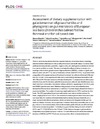Identificador persistente para citar o vincular este elemento:
https://accedacris.ulpgc.es/jspui/handle/10553/71943
| Título: | Assessment of dietary supplementation with galactomannan oligosaccharides and phytogenics on gut microbiota of European sea bass (Dicentrarchus Labrax) fed low fishmeal and fish oil based diet | Autores/as: | Rimoldi, Simona Torrecillas, Silvia Montero Vítores, Daniel Gini, Elisabetta Makol, Alex Victoria Valdenegro, V. Izquierdo López, María Soledad Terova, Genciana |
Clasificación UNESCO: | 310502 Piscicultura | Palabras clave: | Diet Genetically modified organism Gastrointestinal tract Bacteria Microbiome, et al. |
Fecha de publicación: | 2020 | Publicación seriada: | PLoS ONE | Resumen: | This is an open access article distributed under the terms of the Creative Commons Attribution License, which permits unrestricted use, distribution, and reproduction in any medium, provided the original author and source are credited.There is an increasing interest from the aquafeed industry in functional feeds containing selected additives that improve fish growth performance and health status. Functional feed additives include probiotics, prebiotics, organic acids, and phytogenics (substances derived from plants and their extracts). This study evaluated the effects of dietary inclusion of a mucilage extract rich in galactomannan oligosaccharides (GMOS), a mixture of garlic and labiatae-plants oils (PHYTO), and a combination of them (GMOSPHYTO), on gut microbiota composition of European sea bass (Dicentrarchus labrax) fed with a low fishmeal (FM) and fish oil (FO) diet. Three experimental diets and a control diet (plant-based formulation with 10% FM and 6% FO) were tested in a 63-days feeding trial. To analyze the microbiota associated to feeds and the intestinal autochthonous (mucosa-adhered) and allochthonous (transient) microbial communities, the Illumina MiSeq platform for sequencing of 16S rRNA gene and QIIME2 pipeline were used. Metabarcoding analysis of feed-associated bacteria showed that the microbial communities of control (CTRL) feed deeply differed from those of experimental diets. The number of reads was significantly lower in CTRL feed than in other feeds. The OTU (operational taxonomic unit) number was instead similar between the feeds, ranging from 42 to 50 OTUs. The variation of resident gut microbiota induced by diet was lower than the variation of transient intestinal microbiota, because feedstuffs are a major source of allochthonous bacteria, which can temporarily integrate into the gut transient microbiome. However, the composition of transient bacterial communities was not simply a mirror of feed-borne bacteria. Indeed, the microbial profile of feeds was different from both faecal and mucosa profiles. Our findings suggest that the dietary inclusion of GMOS (0.5%) and PHYTO (0.02%) in a low FM and FO diet induces changes in gut microbiota composition of European sea bass. However, if on allochthonous microbiota the combined inclusion of GMOS and PHYTO showed an antagonistic effect on bactericidal activity against Vibrionales, at mucosa level, only GMOSPHYTO diet increased the relative abundance of Bacteroidales, Lactobacillales, and Clostridiales resident bacterial orders. The main beneficial effects of GMOS and PHYTO on gut microbiota are the reduction of coliforms and Vibrionales bacteria, which include several potentially pathogenic species for fish, and the enrichment of gut microbiota composition with butyrate producer taxa. Therefore, these functional ingredients have a great potential to be used as health-promoting agents in the farming of European sea bass and other marine fish. | URI: | https://accedacris.ulpgc.es/handle/10553/71943 | DOI: | 10.1371/journal.pone.0231494 | Fuente: | PLoS ONE [EISSN 1932-6203], v. 15 (4) |
| Colección: | Artículos |
Citas SCOPUSTM
74
actualizado el 08-jun-2025
Citas de WEB OF SCIENCETM
Citations
72
actualizado el 08-feb-2026
Visitas 5
327
actualizado el 25-oct-2025
Descargas
215
actualizado el 25-oct-2025
Google ScholarTM
Verifica
Altmetric
Comparte
Exporta metadatos
Los elementos en ULPGC accedaCRIS están protegidos por derechos de autor con todos los derechos reservados, a menos que se indique lo contrario.
